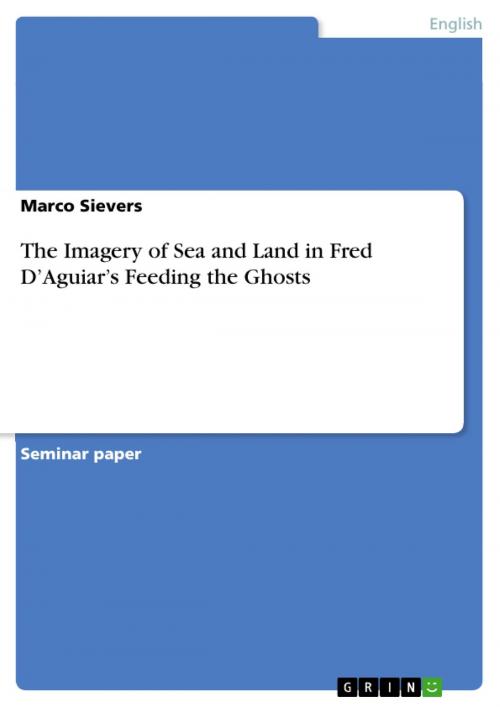The Imagery of Sea and Land in Fred D'Aguiar's Feeding the Ghosts
Fiction & Literature, Literary Theory & Criticism, British| Author: | Marco Sievers | ISBN: | 9783640241415 |
| Publisher: | GRIN Verlag | Publication: | January 8, 2009 |
| Imprint: | GRIN Verlag | Language: | English |
| Author: | Marco Sievers |
| ISBN: | 9783640241415 |
| Publisher: | GRIN Verlag |
| Publication: | January 8, 2009 |
| Imprint: | GRIN Verlag |
| Language: | English |
Seminar paper from the year 2007 in the subject English Language and Literature Studies - Literature, grade: 1,0, University of Hannover (Englisches Seminar), course: HS Caribbean Literature and Culture, 26 entries in the bibliography, language: English, abstract: (...) The novel belongs to the genre of the Caribbean novels, and, as a historical fiction about the slave trade, provocatively combines historical and imaginative elements. Thus, it can be subsumed under the term 'revisionist historical novel', which, according to Ansgar Nünning, denotes novels that maintain a positive tension between their status as literature and their status as history (cf. Thieme, 1121; Pichler, 6, 11). Feeding the Ghosts is based on the infamous 'Zong Massacre' which took place in 1781. It was an incident in which 133 slaves were thrown overboard an English slave ship, leading to a civil action in the same year by the ship's owners, who sued their insurers for compensation for the dead slaves. The publicity about the law suit and the concluding verdict, which confirmed the legal status of slaves as cargo, fostered abolitionist support and made them a landmark of the battle against British slave trade in the 18th century. Due to growing public indignation a parliamentary act was finally passed in 1790, which ruled out insurance claims resulting from slave mortality or the jettison of slaves on any account (cf. Low, 106 et seq.; Pichler, 6; Philp, 245; Baucom, 61 et seq., Frias 421, Schatteman, 234; James, 327). In order to recreate the trauma of the Middle Passage D' Aguiar's fictionalised treatment of the Zong Massacre and of the subsequent trial mainly focuses on the reconstruction of the events from a slave girl's point of view, (cf. Schatteman, 234, Phil, 245; Carr, Pichler, 11). Since the most prominent feature of D' Aguiar's fiction is his poetic style, which is an object of acclaim as well as of critical reprimand (cf. Steward, 68; Figueredo, 211; Frias, 418; James, 327; Bovenschen; Low, 110; Schatteman, 234; Carr), the paper at hand chooses the novel's imagery as its subject-matter and examines the principal dichotomy of sea and land. By elucidating their meanings the analysis will show that these images are multilayered metaphors which mutually influence each other, and explain other imagery they are connected to. Subsequently, sea and land will analysed in the light of the concept of writing back in Postcolonial Criticism in order to point out that they are part of a distinctive, reconciling approach, which aims at understanding history by personality and at recompense by remembrance
Seminar paper from the year 2007 in the subject English Language and Literature Studies - Literature, grade: 1,0, University of Hannover (Englisches Seminar), course: HS Caribbean Literature and Culture, 26 entries in the bibliography, language: English, abstract: (...) The novel belongs to the genre of the Caribbean novels, and, as a historical fiction about the slave trade, provocatively combines historical and imaginative elements. Thus, it can be subsumed under the term 'revisionist historical novel', which, according to Ansgar Nünning, denotes novels that maintain a positive tension between their status as literature and their status as history (cf. Thieme, 1121; Pichler, 6, 11). Feeding the Ghosts is based on the infamous 'Zong Massacre' which took place in 1781. It was an incident in which 133 slaves were thrown overboard an English slave ship, leading to a civil action in the same year by the ship's owners, who sued their insurers for compensation for the dead slaves. The publicity about the law suit and the concluding verdict, which confirmed the legal status of slaves as cargo, fostered abolitionist support and made them a landmark of the battle against British slave trade in the 18th century. Due to growing public indignation a parliamentary act was finally passed in 1790, which ruled out insurance claims resulting from slave mortality or the jettison of slaves on any account (cf. Low, 106 et seq.; Pichler, 6; Philp, 245; Baucom, 61 et seq., Frias 421, Schatteman, 234; James, 327). In order to recreate the trauma of the Middle Passage D' Aguiar's fictionalised treatment of the Zong Massacre and of the subsequent trial mainly focuses on the reconstruction of the events from a slave girl's point of view, (cf. Schatteman, 234, Phil, 245; Carr, Pichler, 11). Since the most prominent feature of D' Aguiar's fiction is his poetic style, which is an object of acclaim as well as of critical reprimand (cf. Steward, 68; Figueredo, 211; Frias, 418; James, 327; Bovenschen; Low, 110; Schatteman, 234; Carr), the paper at hand chooses the novel's imagery as its subject-matter and examines the principal dichotomy of sea and land. By elucidating their meanings the analysis will show that these images are multilayered metaphors which mutually influence each other, and explain other imagery they are connected to. Subsequently, sea and land will analysed in the light of the concept of writing back in Postcolonial Criticism in order to point out that they are part of a distinctive, reconciling approach, which aims at understanding history by personality and at recompense by remembrance















